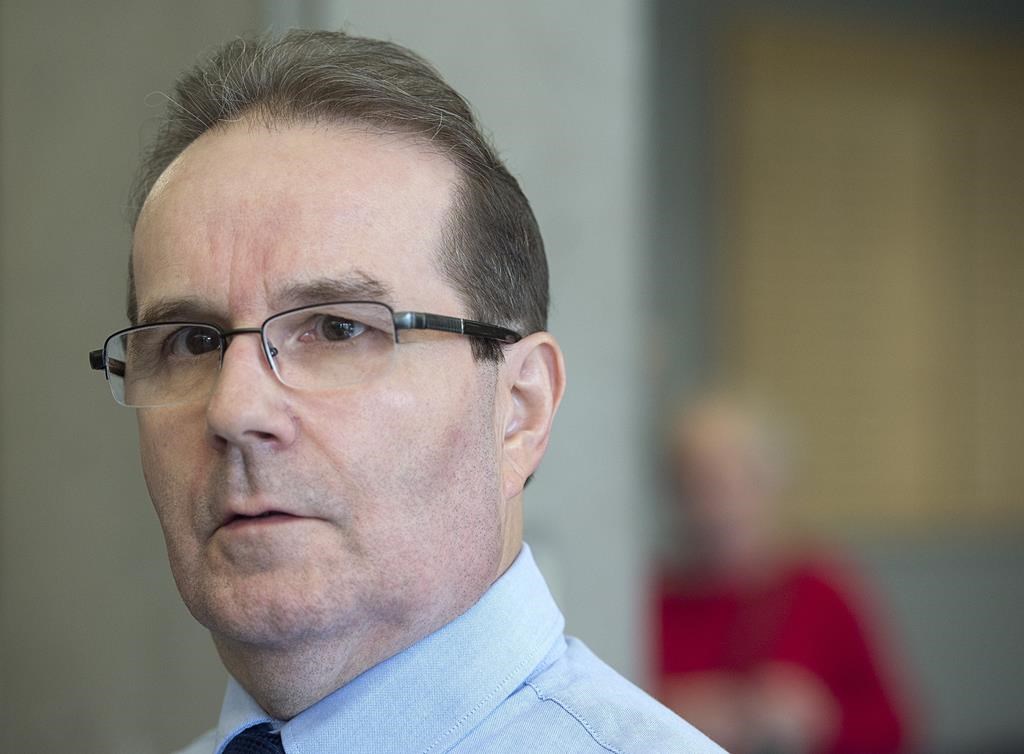Michael B. Jordan has spoken out on the wrongful murder conviction of Nova Scotia’s Glen Assoun in an online video that seeks to raise funds for Innocence Canada, a non-profit organization that helped Assoun earn his freedom.

The YouTube video, which has raked in over 350,000 views since Dec. 18, was released as part of a series to promote the film Just Mercy, which will be released on Jan. 10.
The film is based on the true story of the legal team that fought to overturn the wrongful conviction of Walter McMillian.
McMillan was sentenced to die in Alabama in 1987 for the murder of an 18-year-old-girl despite multiple discrepancies in evidence and testimony presented at trial.
READ MORE: The timeline of the wrongful murder conviction of Halifax’s Glen Assoun
He spent six years on death row before his conviction was overturned, thanks to the efforts of the Equal Justice Initiative that showed witnesses had lied on the stand and the prosecution had illegally suppressed exculpatory evidence.
The video shows the Black Panther and Creed star talking about a man who was denied legal aid, leading to a sentence of life in prison.
“Imagine a murder investigation that suppressed and actually destroyed information,” Jordan said into the camera. “That’s exactly what happened to one Nova Scotia man when his ex-girlfriend was found murdered in Halifax.”
“Without a lawyer he was tried and convicted and locked up.”
Although the actor does not mention a name in the video, the director of development at Innocence Canada, Kerry Emmonds, has confirmed that Jordan is discussing Glen Assoun.
_848x480_1572451395878.jpg?w=1040&quality=70&strip=all)
Innocence Canada advocates for those who believe they’ve been wrongfully convicted and is currently reviewing more than 80 claims of innocence.
Jordan, along with fellow cast member Brie Larson, Jamie Foxx and director Bryan Stevenson released videos urging Canadians to donate to Innocence Canada.

Get breaking National news
“Without financial support for the wrongly convicted, it could be forced to close its doors as soon as the end of 2020,” reads promotional material from the campaign.
Innocence Canada has helped exonerate 23 people since 1993, including David Milgaard, Tammy Marquardt and Steven Truscott — some of whom are alluded to by Foxx, Larson and Steven in their videos.
READ MORE: Daughter of wrongfully convicted man had police job dropped as she helped father
The wrongful conviction of Glen Assoun
Assoun was wrongfully convicted in 1999 for the murder of his ex-girlfriend Brenda Way on Nov. 15, 1995, when her body was found in a Dartmouth parking lot.
On Sept. 17, 1999, Assoun was convicted by a jury and sentenced to life in prison with no chance of applying for parole for 18 years.
He spent the next 16 years and eight months behind bars, where he suffered beatings, multiple heart attacks and developed mental health problems.
The case against him was based largely on the testimony of witnesses whose circumstantial evidence has since been questioned by lawyers who work to free the wrongfully convicted.
During his trial, he fired his lawyer. Though he told the judge he felt he needed counsel, Assoun ended up defending himself in the complex proceedings.
Disputes over the validity of the prosecution have been in the public domain for years.
Assoun began fighting for his freedom while in jail, initially sending letters to American-Canadian boxer Rubin Carter — who was wrongfully convicted of murder and exonerated — and later having his case taken up by Innocence Canada lawyers.
They later applied to the federal Justice Department for a review, spending more than 12 years quietly battling for his release.
Assoun sought an appeal, but the Nova Scotia Court of Appeal dismissed his case on April 20, 2006.
However, the appeal court confirmed police were never able to find physical or forensic evidence for their case.

Assoun was released on bail in November 2014, based on a preliminary assessment that determined he may have been wrongfully convicted.
Finally, on March 1 of this year, Justice Minister David Lametti quashed Assoun’s conviction. He said that Assoun should be granted a new trial because he was a victim of a miscarriage of justice.
A few hours later Assoun would appear in Nova Scotia Supreme Court and plead not guilty when the second-degree murder charge was read aloud.
Crown prosecutor Mark Scott then said, “There is no longer a realistic prospect of conviction.”
The case was immediately dismissed.
READ MORE: Evidence of possible serial killer in Halifax wrongful conviction case was destroyed, finds report
Federal documents would later provide information that the RCMP chose not to disclose an investigator’s theories about other suspects to the defence.
The Mounties also digitally erased or destroyed other potential evidence – including the possibility a serial killer, Michael McGray, was a suspect.
The federal report stated that McGray has denied killing Way.
Assoun has begun to receive interim compensation from the federal and provincial governments as the result of his wrongful conviction. The terms of the agreement remain undisclosed.
Assoun and his legal team have called for an inquiry into his wrongful conviction.
Nova Scotia has yet to announce whether they will conduct an inquiry.
With files from the Canadian Press and Elizabeth McSheffrey












Comments
Comments closed.
Due to the sensitive and/or legal subject matter of some of the content on globalnews.ca, we reserve the ability to disable comments from time to time.
Please see our Commenting Policy for more.